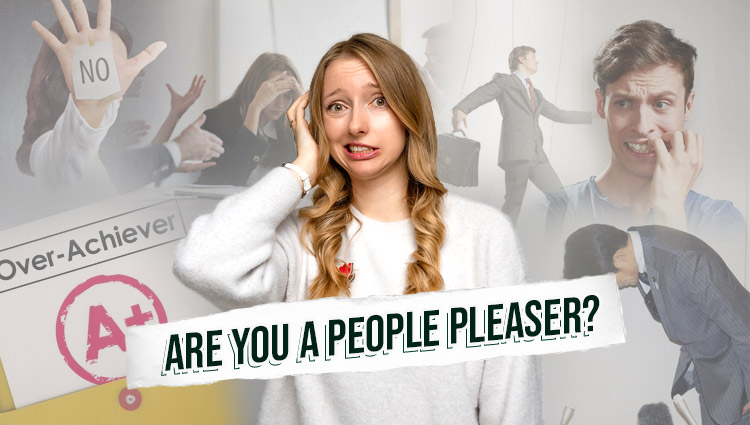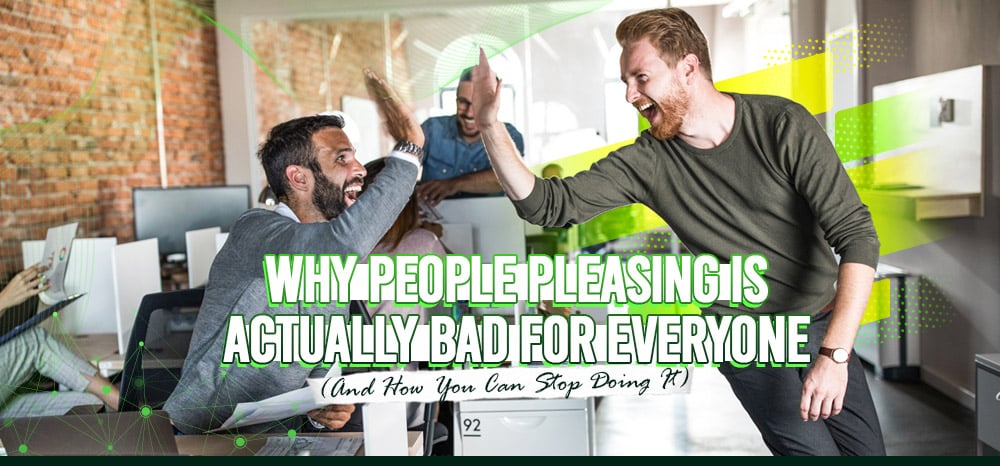Who doesn’t want to be liked? Human beings are innately social creatures, and we all have this instinctive need to get people to like us. (Yes, even that colleague or employee of yours who claims not to care.)
To be fair, being liked comes with a lot of advantages. It’s easier to make friends, for one.
And get this, people don’t buy from or do business with brands or people they don’t like either.
However, some people take things too far by constantly engaging in people-pleasing. It might look like being nice or being kind at first, but it actually doesn’t help anyone and causes more issues later on.
Let’s take a look.
What is People-Pleasing?

People-pleasing is when you put people first – even at the expense of your own needs and wants.
Sure, it’s great to be considerate of others and no one wants to be thought of as selfish, but people pleasers go out of their way to help people, often wasting their time, energy, and resources in the process.
This kind of behaviour typically stems from low self-esteem. People pleasers often desperately want people to like and appreciate them, and think this is the only way to make that happen.
For some, people pleasing is a way to get validation. A few also engage in it because they want everything to be perfect, including the thoughts and feelings of others.
Lastly, people-pleasing can also be a symptom of poor mental health. Those who suffer from conditions like anxiety and depression are more likely to exhibit such behaviour.
Are You a People Pleaser? Ten Signs to Look Out For

So, what does people-pleasing behaviour look like? Some signs include:
- The inability to say “no”
- Feeling guilty for saying “no”
- Constantly fearing that people will think you’re mean or selfish
- Apologising for things that aren’t your fault
- Needing to feel in control
- Overachieving tendencies
- Being unable to admit your true feelings
- Feeling responsible for other people’s feelings
- Avoiding conflict at all costs
- Agreeing to do things you don’t actually like to do
Why People Pleasing Doesn’t Help Anyone
There’s nothing wrong with being kind and helpful to others. I mean, come on, society would collapse if all of us only looked out for ourselves.
However, crossing the line into people-pleasing isn’t healthy either. Here’s why:
Weakens Relationships

Going out of your way to fulfil other people’s expectations can make you resent these same people you want to help. Conversely, they can end up taking your kindness for granted as a result.
Not exactly a healthy relationship dynamic, right?
Diminishes Willpower

Guess what? Your energy and willpower are finite. Use up too much of these to help others, and there won’t be any left for yourself.
Erodes Self-Worth

People-pleasing makes it impossible to establish healthy boundaries, which is necessary for self-preservation.
Constantly putting others first pulls you away from your own goals and dreams – and cost you your authenticity, passion, and self-worth.
Causes Stress and Anxiety

There’s no way you can please everyone, so people-pleasing sets you up for failure. The resulting stress from this unfulfilling endeavour can even lead to dire consequences for your health.
Might Make You Less Likeable in the Long Run

Ironic, isn’t it?
Yep, once people realise you’re desperate to get them to like you, they’ll be less likely to. You can’t fool people forever, and it won’t be long before they realise that you aren’t being your authentic self.
Baby Steps: Curbing Your People-Pleasing Tendencies

The key is learning how to prioritise your needs before you help other people. But if doing that feels unnatural, you can try making gradual changes, such as:
- Establishing boundaries (!)
- Paying attention to how you talk to yourself
- Engaging in positive self-talk
- Accepting yourself
- Letting go of the past
- Pausing before responding to a request (and considering if it’s something you actually want to do)
- Recognizing that relationships are two-way streets
As a final note, it’s important to remember that you can’t control how other people feel and think about you. But you do have full control over how you see and treat yourself.
Remote Staff has been helping AU SME’s and entrepreneurs like you find and hire skilled Filipino remote workers for the past 15 years and counting. We take care of all the legwork to ensure that you’ll have time and energy left for the things that really matter, whether it’s taking your business to new heights or striving to be your most authentic and best self.
Call us today or schedule a call back and let’s start building your dream team.
Serena has been working remotely and writing content for the better part of the last decade. To date, she's written for Pepper.ph and Mabuhay Magazine, among others, and has churned out more than a thousand articles on everything from The Basics of Stock Market Investing to How to Make Milk Tea-Flavored Taho at home. Hermits, aspiring hermits, and non-hermits with interesting project propositions may email her at serena.estrella10@gmail.com.
























 Zero Recruitment Fee
Zero Recruitment Fee